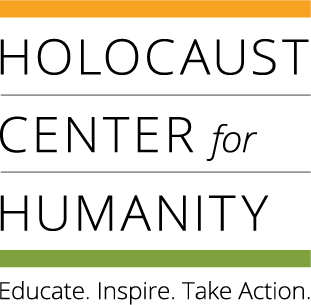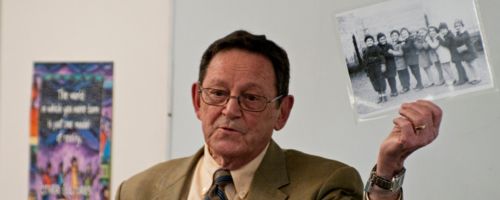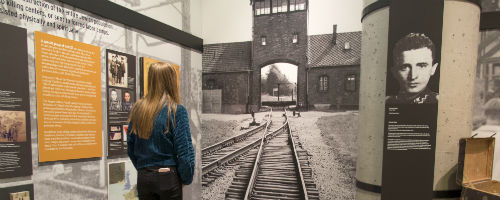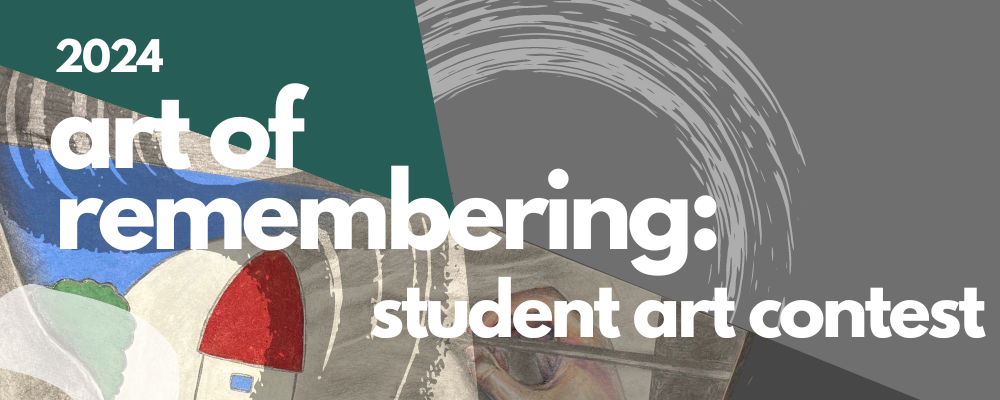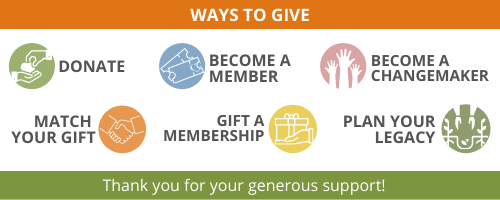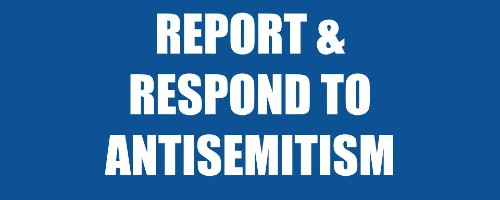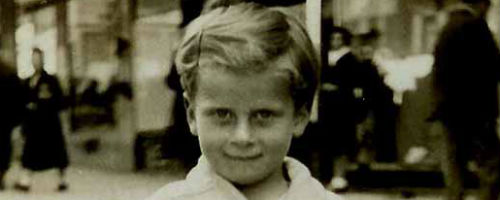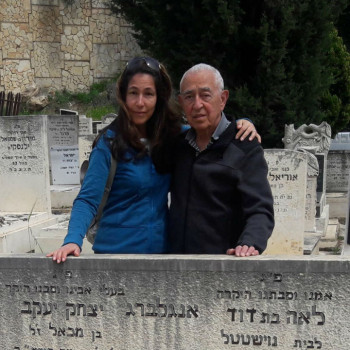
 Michal’s father, Arieh Engelberg, was born in Tanobrezg, Poland in 1934. “I am the daughter of a Holocaust survivor. There are many and different Holocaust survivor stories. My family was expelled from their home town of Tarnobrezg, Poland where they had resided for generations. My family was expelled for one reason only – because they were Jewish. They were not alone. Thousands of Jews were expelled from Polish towns – where did they go? How did they know to go there? How did they survive? This is the story of my family.”
Michal’s father, Arieh Engelberg, was born in Tanobrezg, Poland in 1934. “I am the daughter of a Holocaust survivor. There are many and different Holocaust survivor stories. My family was expelled from their home town of Tarnobrezg, Poland where they had resided for generations. My family was expelled for one reason only – because they were Jewish. They were not alone. Thousands of Jews were expelled from Polish towns – where did they go? How did they know to go there? How did they survive? This is the story of my family.”
In 1939, when Arieh was only 5 years old, Germany invaded Poland. As part of the Molotov-Ribbentrop Pact, dividing Poland between Germany and the Soviet Union, Polish Jews living close to the dividing line with the Soviet Union in Poland were forced to leave their homes.
Arieh’s family decided that it would be safest to move east into the Soviet Union with the hope that they would be able to return to their home soon. Instead, they became part of a migrant group sent to various labor camps as far away as Siberia. When the war ended, they were loaded onto railcars and sent back to Poland. They applied for visas to Israel, which were granted in 1950.
The Engelberg family traveled over 12,000 miles between 1939 and 1950 escaping the Holocaust.
In Israel, Arieh served in the Israeli Defense Forces and became a mechanical engineer. He married Michal’s mother, Sarah, in 1964. In 1975 Arieh moved to Vancouver, BC, accepting a job as an off-shore and sub-sea engineer. In 1976 his wife and family joined him.
“My father’s family was propelled into a life they didn’t wish for and had no control over. With the help of the Holocaust Center for Humanity, my father’s oral and written testimonies and his school certificates, I was able to trace my family throughout the war. My father’s school certificates became important historical documents to unravel my family’s route as dictated by the communist regime.”
With primary sources, maps, and her father’s video testimony, Michal brings life to her family history.
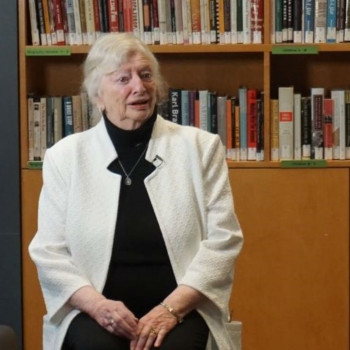
 Harriet Mendels was born in the Netherlands to a large Jewish family that was assimilated into Dutch society. Harriet and her brother spent their childhood in the seaside town of Scheveningen, Holland.
Harriet Mendels was born in the Netherlands to a large Jewish family that was assimilated into Dutch society. Harriet and her brother spent their childhood in the seaside town of Scheveningen, Holland.
Her grandfather Pierre, a journalist, traveled through Germany for business in the late 1930s and witnessed the rise and adoption of Nazism along with its antisemitic propaganda. He warned his daughter and son-in-law of the impending danger, urging them to leave Holland while there was still time. Reluctantly, they decided to follow his advice.
The Mendels family – Harriet and her parents, brother, and two aunts – were able to get exit visas from Holland. They also contacted a distant relative in the United States who provided an affidavit of sponsorship for the family. They left Holland and arrived in Hoboken, New Jersey, in May 1939.
Harriet grew up in New York, learning English and adjusting to a new life far from her home country. She was always aware that she was Jewish and occasionally encountered antisemitism in the United States.
Harriet is a mother and grandmother and has been a teacher, activist, local politician, and author. In 2018, aware of rising Holocaust denial, she decided to tell her story, and worked with the Holocaust Center to research her family history more in depth to become a member of the Center’s Speakers Bureau.
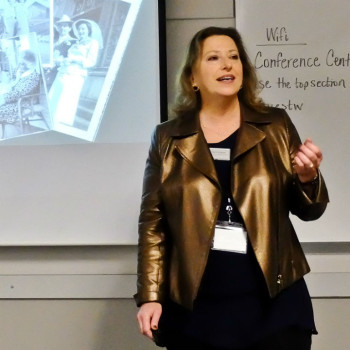
The daughter of two survivors, Naomi tells the stories of her parents from primary source documents and historical records.

Naomi is the daughter of two Holocaust survivors. She tells the stories of both of her parents with details from primary source documents and historical records. Their survival is truly remarkable.
In 1938, Naomi’s father Eric Weiss, attended a rally in Vienna after the Germans occupied Austria. He sensed that he had to get his parents out of Vienna and escape himself. He arranged for his parents to take an Eastern escape route through Russia to Yokahama, Japan and finall y to Portland, Oregon. Eric’s acceptance to the Hebrew University allowed him to leave Germany for what was then Palestine under British rule (now Israel). While in Palestine, Eric was recruited to work for as a spy for the British and traveled to Egypt, Algiers, Tunisia, Libya, and Italy in that capacity. He served from 1939-1944.
Naomi’s mother, Gerda Feldmann, was born in 1923 in a small town in what is now the Czech Republic. The Germans invaded Czechoslovakia in 1939 when Gerda was 16. She was sent to a series of slave labor camps in Poland and was finally liberated by British forces at Bergen-Belsen. Gerda, ill with typhus, was sent by the Red Cross to Sweden to recuperate, and eventually she too arrived in Palestine.
Gerda and Eric met in Israel, but Eric left in 1950, traveling to Portland to reunite with his parents. Gerda followed and they were married in 1950. Naomi grew up in Portland hearing parts of these stories. Her mother died when Naomi was 17, but her father lived to be 100.
Naomi calls her story, “Resilience: My Family Story .” She gathered all the documents and pictures she could find, consulted with relatives, and researched many details of this story. Her hope, as one of the Holocaust Center’s Legacy Speakers, is to reach young people and help them to understand the way our lives can be threatened, and what each one of us can do to make a difference.
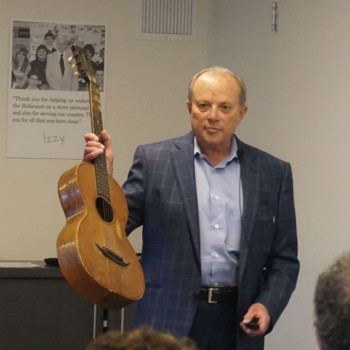
Steve Pruzan's grandparents and his mother fled Germany in 1939, and made their home in the United States.

Steve Pruzan’s grandparents, Max and Helene Schlonau, owned a large farm in Germany. They had owned and operated the farm at Warmsen, Germany for many generations. It was a gathering place for family who lived nearby. His grandfather, Max Schlonau served in World War I. He studied agriculture, enlarged his land holdings, used the most updated agricultural methods, and invented a breeding method for cattle. He was a leader in the area and in the small Jewish community in Warmsen.
Max and Helene married in 1923 and Steve’s mother, Inge was born in 1924. After 1933, when Hitler became Chancellor of Germany, things got progressively more difficult for the Schlonaus. Inge had to take a 5 hour train ride to Hanover in order to go to school as Jewish students were not allowed in German schools. Max was arrested on Kristallnacht and held at Buchenwald Concentration Camp for 3 weeks until his wife paid a fine to get him released.
By 1938 they had made plans to leave Germany. Helene had a cousin who was already settled in Seattle, Dr. Hans Lehmann. Lehman provided the Schlonau’s with an affidavit, and with Max’s agriculture experience, the family was able to expedite the visa process. They sailed from the Netherlands on September 1, 1939. The Schlonaus settled in Seattle where Dr. Lehmann was a prominent physician.
Steve’s mother, Inge attended Seattle University and graduated with a degree in nursing. She married Howard Pruzan, a Seattle attorney.
Steve is a practicing attorney in Seattle. He shares his family’s story as a member of the Speakers Bureau.
